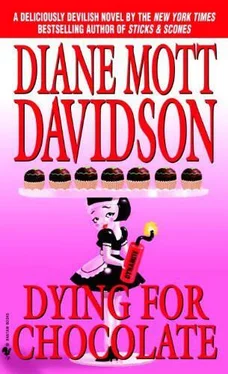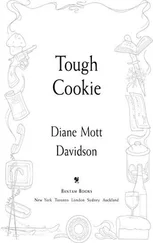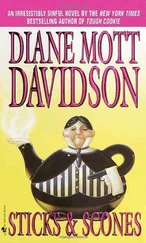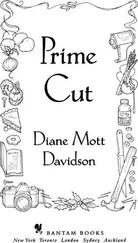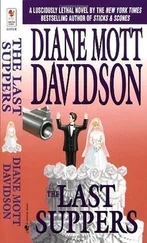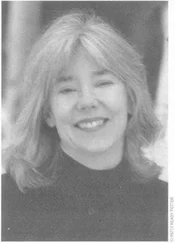I motioned toward the living room.
The general started to lead us in that direction, then turned and said, “You all go in and sit down. I’ll get some coffee. Brandy, too,” he said as an afterthought. Then he pivoted and disappeared across the dining room’s Oriental rug, a lilac-and-salmon-colored Kirman.
We settled into the pink and green ocean of a living room adjoining the foyer. I sat on one of the two rose-colored couches; Schuiz lowered himself uncomfortably into one of the pale green damask wing chairs. Another Kirman, this one in hues of pink and green, floated beneath us, while on the walls green and pink fans and dried floral wreaths vied with neo-Renoir oils.
Schuiz said, “Guy seems awful young for a general. Refresh my memory.”
“He was the army’s ranking man in studying terrorists. Methods and materials,” I said in a low voice. “But nobody told him to share his know-how with the Afghanis. He just did it. He had to retire, sort of a compromise. He still researches and writes about terrorists. My bet is he’s trying to regain the respect of the Pentagon crowd. He is a little odd,” I added.
“Uh-huh,” said Schuiz as he gazed at the shelves on either side of the fireplace. “Look at that.” He pointed to the Farquhars’ stereo. “Motion detector.”
I looked, but saw only a small red light on the side of one of the speakers. I knew how to turn off each of the four loops of the security system; that was the extent of my knowledge.
Schuiz halted his visual inspection long enough to finger a piece of fudge on the coffee table. “Okay if I have one of these?”
“Sure.” The last thing I wanted to think about was food. As an afterthought, I said, “I didn’t make them.” And then I remembered with sudden pain the golden balloons from Philip, which he’d brought with a box of Ferrero Rocher chocolates.
Schulz eyed the fudge skeptically. “Does that mean they’re not very good?”
“It just means I didn’t make them. Julian Teller did. Resident teenager whose father owns a candy shop. Julian’s one of Mrs. Farquhar’s people projects, sort of like Arch and me.”
Schulz chewed and said, “Not bad.” Then he winked at me. “Not as good as yours, though.”
I nodded, uncaring. Fatigue was creeping up my legs like cold water. There was a knot in my stomach. The sight of Philip was coming back.
“I feel light-headed,” I whispered to Schulz. He nodded sympathetically.
“Here we go,” said General Bo as he strode in with a silver tray. “Brandy and coffee.”
“General Farquhar,” I said after clearing my throat, “I tried to help the person who was killed. His name was . . . Philip Miller. I’m sorry, I . . . ran the T-bird into a utility pole.”
“Philip Miller.” The general looked at me with disbelief. “Julian’s shrink?”
“Yes,” I said, although I had not known this. “And my friend.”
The general frowned. “Jesus.” He handed me a brandy snifter. “Unbelievable. How did it happen?”
During my retelling of the accident story, the general shook his head just perceptibly with each detail, as if I were a subordinate commanding officer who had let a battle get out of hand. When I came to the part about the Thunderbird, he asked for its location so he could call to have it towed. And where were the keys? He would pick them up later, as they contained a house key.
“Has Arch called?” I asked.
The general lifted one eyebrow above his pale blue gaze. “Yes. He was only told he needed a ride home, he didn’t know about any of this . . .” He tilted his head, and I felt myself drawn into the deep furrows of his forehead. “Goldy. Don’t worry about anything. I have some work to do here, but I’ll pick up those keys and check on the car when I go over to the school later. Adele’s volunteered me to work at the pool site.” His look turned paternal. “Go upstairs and rest now. One of us will bring your son home.”
And then he rose, as if to dismiss us. I drained my brandy, even though I didn’t want it. I wanted to sleep.
When no one moved, General Bo said regretfully, “Putting in the garden today,” as if he had to leave momentarily for a meeting with the Joint Chiefs. He rocked forward on the balls of his new high-top sneakers and opened his eyes wide at me.
Oh, God! I jumped up. Putting in the garden!
“You have to go, you have to go,” I insisted to Schulz.
Schulz did not move. Perched on the absurdly fragile pale green chair, he eyed me and then the general. “Nothing so busy as retirement,” he said solicitously.
I grabbed Schulz’s hand and tugged. “You don’t understand, this is really big, he’s doing some—”
“Actually,” the general said with great seriousness and a glance at his watch, “what I’m working on is killing two birds with one stone.”
“Investigator Schulz,” I said in my most pleading voice, “it is imperative that we both leave immediately. Like now”
Schulz looked at me as if I were crazy. He said nothing and did not move.
“You see,” the general was saying blandly, “my field is terrorist technique.”
Schulz mmhmmed as the general glanced at his watch.
“How much time, how much time?” I demanded.
The general frowned. He said, “T minus two, I’m afraid.” Then abruptly, to Schulz, he said, “I’m going to have to ask you to leave.”
This was not the time for something about the general to attract Schulz’s attention. I knew the homicide investigator well enough to see a slight straightening of the spine, a narrowing of the eyes. Some other time, I begged mentally to Schulz, some other time! My eyes darted around the pink and green living room. White pillows dotted the floral landscape like marshmallows that suddenly swam as I struggled to concentrate. T minus two . . . where should we go?
“Get up,” I said sharply to Schulz as I pulled now on both of his big hands. “Get up, you have to go, we have to get out of here.”
Finally, Schulz heaved himself out of his chair. I glanced at the general. He was looking anxiously out the window, his forehead again wrinkled, this time in alarm.
An explosion shook the house.
“Damn!” yelled the general as he dashed out.
I lost my balance and fell to my knees. Schulz grabbed his chair. Dust and smoke rose before the living-room windows. A Waterford vase on the mantel teetered and fell. The boom reverberated in my ears.
“What the hell was that?” Schulz shouted.
I straightened up and gazed at him.
I said, “I tried to warn you. You wouldn’t listen. That was Putting in the Garden. Terrorist technique.”
6.
“Well,” Schulz said. He looked around the living room, surveyed the dust rising in front of the windows. Then he eyed me and shook his head. He held out his hand to help me up from the floor.
“Interesting folks you’re living with,” he said when I was on my feet again. “Almost as good as a problematic ex-husband. Want to tell me about that?”
I rubbed my bruised elbows and muttered a negative. Schulz shrugged and turned. I followed his saunter to the front door. Schulz’s presence, his great reservoir of calm, were things I was not yet ready to let go.
As if to reassure myself, I said, “I’ll be okay here.”
He shook his head again, took a deep breath. “Is there anyone inside this house right now? Or is everyone tending the aftermath of this garden bomb?”
Before I could answer, the phone bleated in the kitchen. I asked Schulz to wait and went to see which neighbor was going to be the first to complain.
But it was not a neighbor. In her role as vivacious volunteer, Adele was helping to coordinate a church music conference that would convene in Aspen Meadow in July. This call was from an Episcopal church organist and choirmaster in Salt Lake City. In a nasal tone, he demanded to know when Adele would return.
Читать дальше
